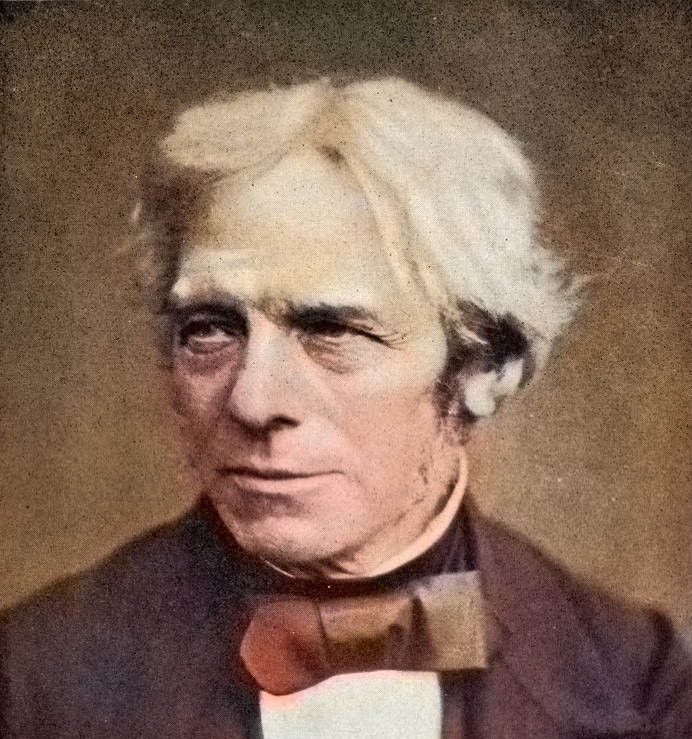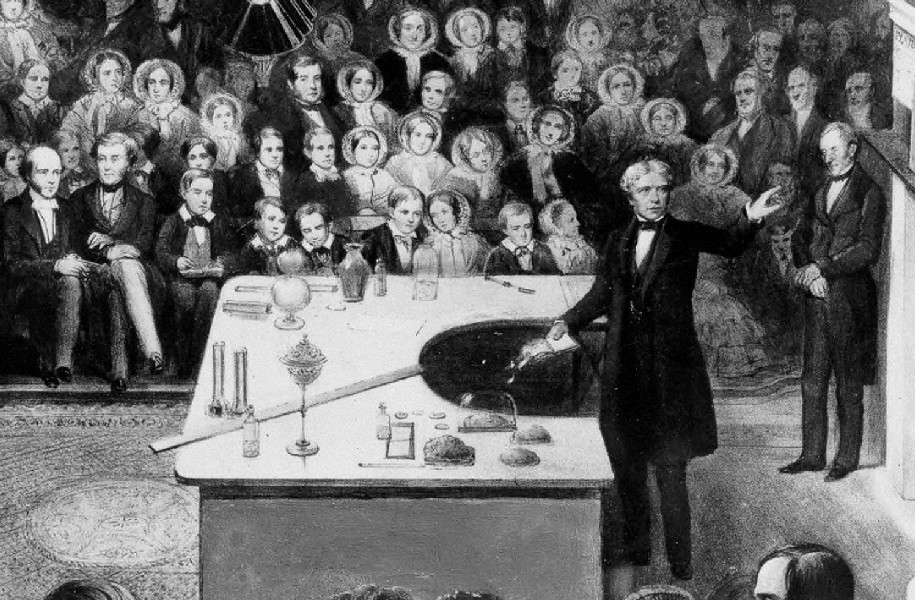
Although Faraday received little formal education, he was one of the most influential scientists in history becoming the inspiration for likes of Einstein and Tesla. He is best known for the discovery of electromagnetic induction, his invention of the electric motor, contributions to electrochemistry or due to the fact that he was responsible for introducing the concept of field in physics.
In 1873, the standard unit of electrical capacitance was named farad in his honor. The Bank of England unveiled a £20 bill with his portrait in 1991 as he joined a distinguished group of Britons with their own notes, including William Shakespeare, Florence Nightingale and Isaac Newton. Many claim him the father of electricity and in fact, Maxwell himself had said, "Faraday is, and must always remain, the father of that enlarged science of electromagnetism."
Early education
Michael Faraday was born to Margaret and James Faraday on 22nd September, 1791. The family was not well off so they moved to London seeking more opportunities. The young Faraday, who was the third of four children, having only the most basic school education, had to educate himself, while working on the streets of London.
At the age of 14, Faraday became an apprentice to a local bookbinder and bookseller, George Riebau, in Blandford Street, Marylebone. During his seven years of apprenticeship, Faraday made good use of the priceless access to books which his employment gave him and which his generous employer allowed.

Faraday was deeply motivated by the book, "Conversations on chemistry" by Jane Marcet so much so that when 20 years old, he attended the lectures by the most renowned English chemist of the time, Sir Humphry Davy. Faraday later on sent Davy a 300-page book based on the notes that he had taken during these lectures. Davy's reply was immediate, kind, and favourable.
The first invention
In 1813, when Davy damaged his eyesight in an accident with nitrogen trichloride, he decided to take Faraday as temporary assistant. In the class-based English society, Faraday was not considered a gentleman, because of which, Davy's wife declined to treat Faraday as an equal making his life so miserable that he contemplated suicide.
But Davy refused to let the talented young man go. He employed Faraday permanently as his scientific assistant much to his wife's displeasure. They went together on a tour of the continent meeting the scientific elite of Europe as well as exchanging ideas with them. Davy joked that his assistant Michael Faraday was his greatest discovery; little did he know that he'd be right!
In 1820, Danish physicist Hans Ørsted discovered (although by accident) that electric current in a wire could deflect magnetic needle in the immediate vicinity. Davy wasn't bothered the least by it, but Faraday, on the contrary, declared it one of the greatest discoveries of mankind. One year later, Faraday invented the electric motor by using the same principle, which is today the basis of fans, pumps, compressors, elevators, and refrigerators.

Faraday's rapid rise made Davy jealous and he became indifferent to him, treating him more as a challenger. Towards the end, Davy even accused Faraday of plagiarism causing Faraday to cease all research in electromagnetism until his mentor's death. In 1829, Davy was paralyzed by a stroke and passed away aged 50. Despite the bitter ending, Faraday described Davy fatherlike, kind and protective.
Electromagnetism
Thus, Faraday began his great series of experiments, in which he discovered the law of electromagnetic induction. The breakthrough came when he wrapped two insulated coils of wire around an iron ring, and found that upon passing a current through one coil, a brief current was induced in the other coil.
Faraday went on to invent a rudimentary generator in 1831 and as the story is usually told, the prime minister or some other senior politician was given a demonstration of induction by Faraday. When asked, “What good is it?” Faraday replied: “What good is a newborn baby?” Fifty years passed before electric power really took off as envisioned by Faraday.

Faraday was little interested in mathematics and his own scientific career was characterized by simple ideas and simple experiments. But the discovery of induction was eventually formalized by Scottish physicist and mathematician James Clerk Maxwell into an equation now known as Maxwell–Faraday equation.
Faraday wrote in a letter to Maxwell, "I was at first almost frightened when I saw such mathematical force made to bear upon the subject, and then wondered to see that the subject stood it so well." The equation by Maxwell became the foundation of power generation hence making Faraday the father of electricity.
Later life
After induction, Faraday formulated the laws of electrolysis in 1834 whose applications are far and wide such as production of industrial chemicals and electroplating. For his unprecedented work, Faraday was appointed the Professor of Chemistry at the Royal Institution without a degree. He was also offered a knighthood but he turned it down citing religion.
In 1836, he invented the Faraday cage, an enclosure used to block the electromagnetic field. You can find a real-life version of Faraday cage right inside your kitchen: the metal shell in the microwave oven acts like a Faraday cage as it prevents the microwaves inside the oven from leaking out. Faraday cages are also used in MRI scans to prevent external frequencies from causing any distortion to the data coming from the patient.
Beyond his scientific research into areas such as chemistry and physics, Faraday accepted numerous, and often time-consuming, service projects for the greater good of the country. For example, every Christmas, Faraday would give free science lectures to a general audience, including young people, in an informative and entertaining manner.

He delighted in filling soap bubbles with various gasses in front of his audiences and marveled at the rich colors of polarized lights, but the lectures were also deeply philosophical. In this way, Faraday was really the world's first science communicator. He delivered a total of nineteen such lectures until he was 53 years old.
Many years after his scientific career, Faraday dedicated a book to George Riebau, his first employer, writing: "...you kindly interested yourself in the progress I made in the knowledge of facts relating to the different theories in existence, readily permitting me to examine those books in your possession that were in any way related to the subjects occupying my attention."
Science and religion
Faraday was a devout Christian although there may have been some conflict between his religious beliefs and his activities as a scientist. Many of his colleagues and especially Henry Bence Jones had claimed through letters and writings that Faraday was a scientist first and religious second, but he was also both.
Jones, who was Faraday's junior, published the book, "The Life and Letters of Faraday", in 1870. Faraday said of himself, "Without experiment, I am nothing. In early life I was a very lively, imaginative person, who could believe in the Arabian Nights as easily as in the Encyclopedia, but facts became more important to me, and saved me. I could trust a fact. One thing is fortunate, which is, that whatever our opinions, they do not alter nor derange the facts of nature."
Faraday's laboratory journal entry on 19 March, 1849 says, "ALL THIS IS A DREAM. Still examine it by experiments. Nothing is too wonderful to be true, if it be consistent with the laws of nature; and in such things as these, experiment is the best test of such consistency." Faraday viewed his discoveries of nature's laws as part of the continual process of reading the book of nature.
When asked about his speculations on life beyond death, Faraday replied, "Speculations? I have none. I am resting on certainties. I know whom I have believed and am persuaded that he is able to keep that which I have committed unto him against that day."







 Physics, astronomy and science history blog for students
Physics, astronomy and science history blog for students
Responsive Ad Slot